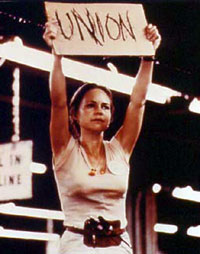Morality and the IR Reforms
I always think it's interesting when institutions who claim a market share of morality and 'family values' get involved in public debate, as has happened recently with the Christian Churches (and the Diggers' Lobby and the self-appointed saviour of the nuclear family) over the pending Industrial Relations reforms. Institutions like these, while working pretty constantly in the justice arena (in the case of the major churches, anyway) generally only get a reasonable media run on the most personal issues, like abortion, or charity, or, like, God and stuff.
The immense media response to the Churches proclamations that the reforms are immoral (see here for the Uniting Church's particularly strong anti-Government reform statement), not intuitively a huge moral issue, is a little puzzling. Why does the media want a moral opinion on what would normally be treated as an economic reform?
It occurs to me that this level of media attention is a direct and proportionate response to the Government's rhetoric. Deliberately, intuitively, Howard has positioned the reforms as an issue of freedom, choice and the common good - on the playing field of Western (Judeo-Christian influenced, whether we like it or not) values - in order to justify why he is promoting individual bargaining over collective, to explain why he doesn't want unions 'interfering', claiming that we are all equal before the law and according to his argument have equal power. In doing so, he has opened himself up to criticism based on morals and values.
While this was coming solely from the union movement, he could dismiss it as grandstanding, but when the Churches and members of parliament become involved, the whole thing backfires on him. Suddenly, union claims that penalty rates are necessary to ensure adequate compensation for lost leisure time, easy to dismiss as extending from sectional interests cos he's already cast unions as irrelevant, become recast as big-picture moral claims - that people need to connect with society, that the Sabbath should be respected as a day of rest and relaxation for the whole community, that common holidays are there to enable public and community interconnection and foster national pride, and that religious traditions should be respected. All things attached to White traditions that Howard has used time and time again to invoke electoral fear against people of other traditions and faiths, to glorify frugal budgetary spending and corollary cutting of basic services, to create electorally-exploitable barriers and divisions, to justify fostering our relationship with America instead of expanding into the non-White region, the list goes on and on and...
The people have shown that they respond to moral guidance that accords with their own interests. But with these reforms, it's just not clear why they won't kill the hip pocket and the family time, and make it less fair, for non-professional, non-managerial workers. So, I reckon, if the Government claims that its reforms are 'for society', the people want to know what moral bodies think. It's backfired gloriously.
